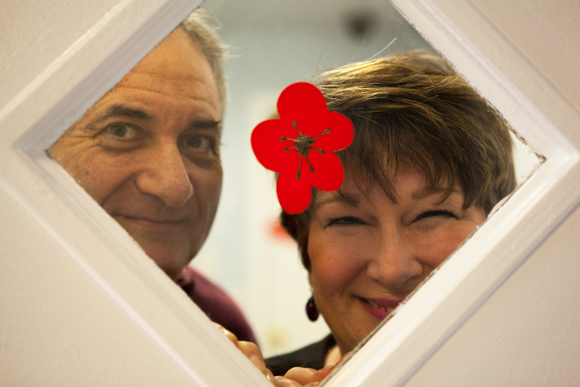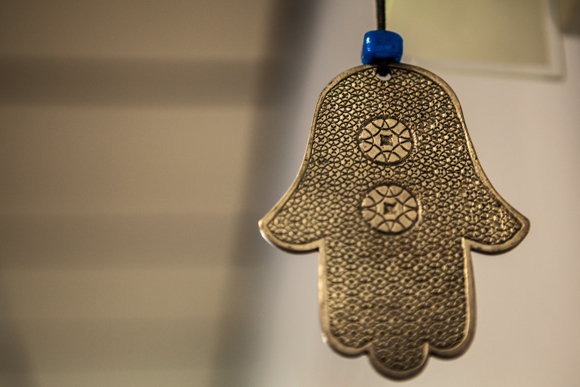In a 1972 press conference, then-President Richard Nixon explained to reporters "the need for money" to sustain what later became known as the War on Drugs. Back then, Nixon's administration had budgeted $100 million to the cause.
Around the same time, Takoma resident Jules Reifkind was diagnosed with multiple sclerosis, a disease that affects nerve cells in the brain and spinal cord. After visiting many doctors and hospitals, he was told to use marijuana.
"It was the 70's. He was horrified," Stephanie Reifkind Kahn says about her father's reaction to the idea. But as more doctors started suggesting it to him, Reifkind found himself in a predicament: how to legally get the only drug that – according to his daughter's recollection – helped ease the pain in his hands and feet, "which he said felt like they were on fire."
"He and my mother were totally freaked out with the idea that they were going to be arrested," Stephanie Kahn says. "He didn't get it very often, but it made a huge difference [when he got it]."
Fast-forward 40 years and the budget to fight the illegal drug trade has jumped to more than $15 billion, according to the 2010
White House budget summary.
Meanwhile, in a small shop on Blair Road in northwest Washington, where new shelves, glass display cases and security cameras were recently installed, Stephanie Kahn and her husband, Rabbi Jeffrey Kahn, await a final inspection and licensing from the city's Department of Health to open Takoma Wellness Center, one of Washington's first medical marijuana dispensaries.

Although it has been reported dispensaries like the Kahns' could open in early April, the city has yet to start registering patients with approved conditions – a process that could take from weeks to months. Data compiled by procon.org, a non-profit that researches controversial issues,
suggests that for every 1,000 people in a state where prescribed marijuana is legal, an average of 7.7 people qualify for the drug. That means that in D.C., roughly 4,700 patients could qualify, injecting millions into city coffers. On the other hand, D.C.'s list of qualifying conditions is among the strictest in the country.
At a time when the federal government labels marijuana a controlled substance and rejects drug trade legalization in Latin America as in other parts of the world, having an operating therapeutic marijuana program in its backyard – literally – could be seen as a slap in the face.
"It's very strange," Jason Klein, a D.C.-based lawyer who specializes in cannabis policy, says about the discrepancy between D.C. and federal laws regulating the drug. "There's nothing they can do to be in compliance with the federal law."
"Congress explicitly provides money to the District to fund" the program, which is illegal by another law approved by Congress. "It's really quite strange."
The Kahns are aware that starting any new business has risks. But in this type of venture, federal agents can swoop in at any time, seize everything and shut down the dispensary, to later send them to prison with drug-trafficking charges.
"We wanted to create a business to help people� to be philanthropists."
But as a Reform rabbi serving four synagogues in 26 years, Jeffrey Kahn says one of his main reasons to undertake this risk was seeing ill people suffering needlessly.
Witnessing the painful deaths of his wife's father and mother, who was diagnosed with lung cancer in 2009 and was told by doctors marijuana could help her, also influenced his perspective on selling cannabis.
"I thought when I first mentioned it to my wife she would say 'no,'" Jeffrey Kahn says. "We thought everybody would think we were crazy, [that] everybody would think it was a bad thing to do."
Surprisingly, he says, even "very conservative friends" stood behind the idea. "We wanted to create a business to help people… to be philanthropists."
But hurdles remain in what has been a long and slow process from the beginning.

Washington voters overwhelmingly approved the creation of a medical marijuana program in 1998. But it wasn't until 2010, when Democrats controlled both houses of Congress and the White House, that the D.C. Council approved a bill allowing the city to set up dispensaries. Congress was given 30 legislative days to overrule the bill, but let it slide.
Back then, the couple thought they would open their new business by the end of 2010. But it's been nearly three years since they began paying rent for their 1200-square-foot location in Washington's Takoma neighborhood, investing most of their savings in the venture, without any profits.
"If at the beginning we knew it was going to be this long I don't think we would have done it," Jeffrey Kahn says.
Despite continuing hurdles, however, the Kahns keep a smile and a positive attitude.
"If one person can get medicine safely who can't get it now and can deal with what they're dealing with better," Jeffrey Kahn says, "then it was worth it."